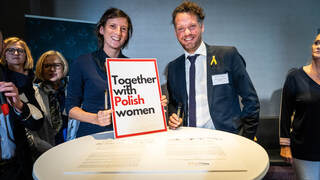 Photo by EPF
Photo by EPF One year after the highly controversial changes to the Polish abortion law making Poland one of the EU-countries with the most restrictive access to abortion care, the human rights and rule of law situation in Poland continues to deteriorate.
Two members of the parliamentary group Parliamentarians for 2030 Agenda, Séverine de Laveleye and Orry Van de Wauwer witnessed this when they participated in the European Parliamentary Forum on Sexual and Reproductive rights’ annual Conference in Warsaw, Poland on 21-22 October. At the end of a first day of panel discussions on SRHR in Poland and worldwide, the participants signed a statement of commitment with regard to Poland and the global state of SRHR.
Two members of the parliamentary group Parliamentarians for 2030 Agenda, Séverine de Laveleye and Orry Van de Wauwer witnessed this when they participated in the European Parliamentary Forum on Sexual and Reproductive rights’ annual Conference in Warsaw, Poland on 21-22 October. At the end of a first day of panel discussions on SRHR in Poland and worldwide, the participants signed a statement of commitment with regard to Poland and the global state of SRHR.
On the second day, they visited Puławy, one of the towns that declared itself an LGBT-free zone. The MPs met with several activists. One of the activists mentioned that she had 81 court cases running against her. Because of the close ties between the government and the judicial system, she will get not a fair trial. But at the same time she said : “my family stopped worrying about a prison sentence, because of all the death threats I have been receiving.” It is clear that human rights defenders in Poland are being silenced and are in need of protection.
Since the members of parliament’s visit to Poland, there have been several legislative proposals that could worsen the situation in Poland: A bill to establish a "Family and Demographic" Institute was passed and will be discussed in the Senate. This Institute would be led by the author of the motion that resulted in the current ban on abortion. The person leading the institute would be able to participate in all court proceedings acting as a prosecutor. He could bring cases against LGBT parents demanding that they are deprived of their parental rights. He would have access to data collected by any government entity in Poland. The goal of the institute is to hike up Poland's birth-rate by limiting the number of divorces and "creating proper social context".
The Polish Ministry of Health is also preparing to amend the laws on the healthcare information system in Poland, which would mandate the registration of all pregnancies in Poland in a supposed strategy to put pregnant women under surveillance (so they can easily be prosecuted if they decide not to continue a pregnancy or even if they suffer a miscarriage).
Luckily one of the most dreadful proposals has been rejected by the Polish Parliament (Sejm). The citizens' bill, drafted by an anti-abortion group, would have mandated long prison sentences in cases of abortion The bill proposed prison sentences of 5 to 25 years, and in certain circumstances life imprisonment, for depriving a "conceived child" of life. Even though this time the Polish Parliament voted against the bill, anti-abortion groups will not stop trying. These different developments show that the fight for SRHR needs to continue to be a priority for Belgium and the EU.
Since the members of parliament’s visit to Poland, there have been several legislative proposals that could worsen the situation in Poland: A bill to establish a "Family and Demographic" Institute was passed and will be discussed in the Senate. This Institute would be led by the author of the motion that resulted in the current ban on abortion. The person leading the institute would be able to participate in all court proceedings acting as a prosecutor. He could bring cases against LGBT parents demanding that they are deprived of their parental rights. He would have access to data collected by any government entity in Poland. The goal of the institute is to hike up Poland's birth-rate by limiting the number of divorces and "creating proper social context".
The Polish Ministry of Health is also preparing to amend the laws on the healthcare information system in Poland, which would mandate the registration of all pregnancies in Poland in a supposed strategy to put pregnant women under surveillance (so they can easily be prosecuted if they decide not to continue a pregnancy or even if they suffer a miscarriage).
Luckily one of the most dreadful proposals has been rejected by the Polish Parliament (Sejm). The citizens' bill, drafted by an anti-abortion group, would have mandated long prison sentences in cases of abortion The bill proposed prison sentences of 5 to 25 years, and in certain circumstances life imprisonment, for depriving a "conceived child" of life. Even though this time the Polish Parliament voted against the bill, anti-abortion groups will not stop trying. These different developments show that the fight for SRHR needs to continue to be a priority for Belgium and the EU.

 RSS Feed
RSS Feed